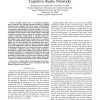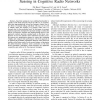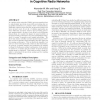134
click to vote
DSD
2010
IEEE
15 years 2 days ago
2010
IEEE
Orthogonal Frequency Division Multiplexing (OFDM) can provide a flexible usage of the spectrum by controlling individual subcarriers. Sets of subcarriers can be zero-modulated to a...
128
click to vote
JSAC
2008
15 years 2 months ago
2008
Cognitive Radio (CR) is a promising technology that can alleviate the spectrum shortage problem by enabling unlicensed users equipped with CRs to coexist with incumbent users in li...
149
click to vote
GLOBECOM
2007
IEEE
15 years 3 months ago
2007
IEEE
—Open spectrum systems allow unlicensed secondary users equipped with cognitive radio to opportunistically access the spectrum underutilized by primary users. Cognitive radio has...
117
click to vote
GLOBECOM
2007
IEEE
15 years 8 months ago
2007
IEEE
— Spectrum sensing is a key enabling functionality in cognitive radio (CR) networks, where the CRs act as secondary users that opportunistically access free frequency bands. Due ...
171
click to vote
VTC
2008
IEEE
15 years 8 months ago
2008
IEEE
This paper considers a scenario in which a secondary user makes opportunistic use of a channel allocated to some primary network. The primary network operates in a time-slotted ma...
139
click to vote
MOBICOM
2009
ACM
15 years 8 months ago
2009
ACM
In cognitive radio networks (CRNs), spectrum sensing is key to opportunistic spectrum access while preventing any unacceptable interference to primary users’ communications. Alt...
105
click to vote
IWCMC
2009
ACM
15 years 8 months ago
2009
ACM
This paper addresses the problem of optimal cooperative spectrum sensing in a cognitive-enabled sensor network where cognitive sensors can cooperate in the sensing of the spectrum...
120
click to vote
INFOCOM
2009
IEEE
15 years 8 months ago
2009
IEEE
—Cooperative spectrum sensing is attracting more attention in Cognitive Radio networks. This paper proposes a fully distributed consensus-based cooperative spectrum sensing schem...



